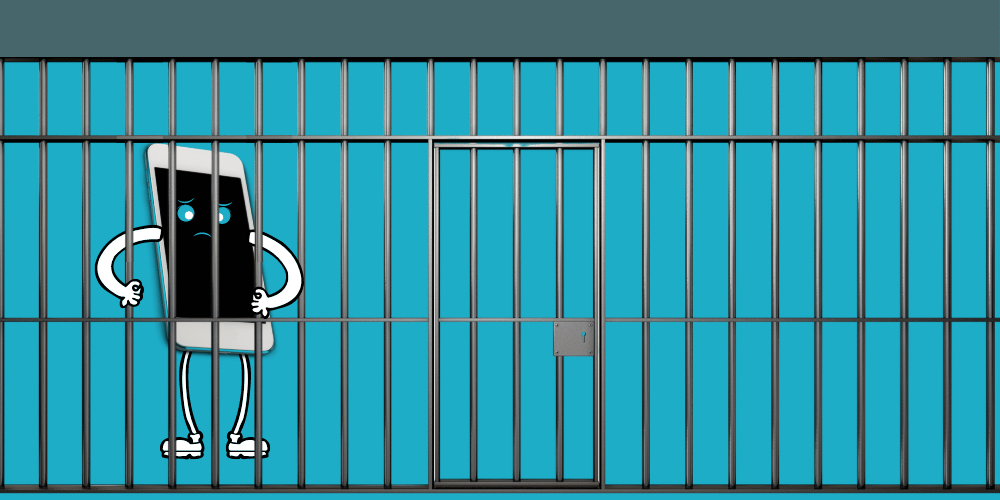This post was last updated on July 13th, 2022 at 09:48 am
Elana Mugdan did what few people have done or have even attempted to do in our digital age.
She gave up her smartphone.
The beverage company Vitaminwater picked Mugdan from a pool of thousands of applicants to participate in its “Scroll Free for a Year” challenge. On Feb. 15, 2019, Mugdan put her iPhone 5S in a “jail” and traded it for a dumb phone until Feb. 15, 2020. Her reward at the challenge’s end: $100,000.
Mugdan, a young adult fantasy author, talked about her year without a smartphone in a Nov. 30 interview with Frugalmatic. The challenge wasn’t easy, especially at first. It overlapped a book tour, leaving Mugdan to crisscross the country without GPS. She also had to socialize without a phone, a task easier said than done because Mugdan avoided looking at other people’s screens to ensure she stayed within the challenge’s rules.
However, over time, Mugdan adjusted. Not having a smartphone went from feeling “very bizarre” to “routine,” she said. “And then it became something where I preferred life without it.”
After the contest, she decided to not go back to using a smartphone, at least not like before. Today, she occasionally uses her old iPhone 5S as a “small, small laptop” with a WiFi connection. But she doesn’t have a data or calling plan and doesn’t take her smartphone with her when she leaves her home.
“I had some unfortunate events that occurred in my life, which forced me to need to access the technology. Specifically, my pet, my snake Medusa, recently got a very troublesome medical diagnosis, and we’ve been fighting through that,” she explained. “Me being the anxious person that I am, I have to monitor her. Often times what I’ve had to do is record her symptoms (with the iPhone) and send them to the vet.”
Mugdan noted she hasn’t fallen back on old bad habits, such as mobile gaming. “I used to be a pretty avid mobile gamer. I was unhealthfully obsessed with a mobile game, a real-time strategy game. I gave that up. I quit cold turkey on Feb. 14, 2019. And that was like a huge time suck for me. Now I don’t play it anymore,” she said.
Below are more excerpts from Mugdan’s Nov. 30 interview reflecting on the “Scroll Free for a Year” challenge.
Frugalmatic: Did the Vitaminwater contest give you the idea to give up your smartphone or had you considered it before that?
Elana Mugdan: I had never considered giving up the smartphone prior to that moment. It was, for a long time, connected at my hip. Like for many young people, it went everywhere with me. I slept with it, and I definitely fell into several unhealthy bad habits with it over the years of use. I became dependent on it, I think that’s safe to say. So it wasn’t anything I was considering. It’s just that the opportunity struck, and I knew I could do it if I put my mind to it, if I had the right incentive. And I had 100,000 good reasons to give it up.
So really it was just a question of mind over matter. I put my mind to it, and, for a while, maybe two or three weeks, it was very bizarre. And then it became normalized, and then it became routine. And then it became something where I preferred life without it.
F: Do you know why you were chosen for this challenge? Did Vitaminwater tell you?
EM: In the original contest rules, Vitaminwater had five points of criteria on which they were judging submissions. These included creativity, humor, originality, correct grammar and brand awareness. Since my slightly off-kilter humor aligns with Vitaminwater’s brand of humor, I think that was the biggest deciding factor. I was very careful to read all the rules and be aware of what they were looking for, and I guess the stars simply aligned for me that time.
F: Once the contest started and you switched to the dumb phone, what was the biggest adjustment that you had to make?
EM: The GPS was the biggest hurdle for me. I had become very dependent on having a pocket-sized device that told me exactly where I needed to go. And also, to a certain extent, a pocket-sized device that gave me the answer to every question I had. So it wasn’t just a question of how do I get from X to Y to Z. It was everything. …
Right after I started the contest and gave up the phone, I also began a book tour. I went to independent bookstores around the country, and I was traveling alone to places I had never been before. I drove 750-some odd miles in one day, and I did it all without a smartphone. And that was difficult, but it made me … a more attentive driver, absolutely.
Everybody who drives—nobody wants to admit it—but you always have the distraction of the phone right there in your pocket or in the cup holder. You’re tempted to look at it. Or, often times, you’re actually using the GPS and the screen is there. And I didn’t have that, all of a sudden.
So I really had to rely on my senses and pay attention to the road and actually use street signs and directions on the highway and mile markers. I had to do math on the fly. … So it was really like I was using my brain at full capacity whenever I was driving and navigating.
Learn about the 4 biggest barriers to giving up your smartphone
F: How did not using a smartphone change your relationships with people, whether friends, family or co-workers?
EM: I think for the people who were closest to me, like my parents, it forced me to work on our relationships, improve our relationship. I had fallen into some pretty bad habits over the years. When we had dinner together, I’d just be constantly on my phone. I wouldn’t be interacting with them.
But for my peers, my friends, it actually created unforeseen difficulties because the technology is so ubiquitous now that it’s become the primary way people communicate with each other.
And it’s become ingrained even in regular conversations. You’re not just sitting on your phone ignoring the people around you. You’re actually interacting with the people around you, but your phone is always there, and it becomes part of the conversation. You talk about a video you saw, and you look it up on your phone, and you share it with your friends. Or, you have a question, or some breaking news happens, and you get an alert on your phone, and suddenly you’re all talking about that.
Or you’re sharing a text message thread that you had with somebody. Some drama happened, and you want to show somebody. I couldn’t be a part of any of that.
I took it to an extreme (during the contest). I didn’t even want to look at other people’s phone screens because I didn’t want to blur that line between observation and use. Because I knew I’d have to pass a lie detector test at the end of the (contest) year, and I didn’t want to give myself any mental acrobatic excuse like, “Oh, but I looked at that phone screen that one time, and so I cheated.”
So, I couldn’t interact with people when they were doing stuff with their phones. It had this strange, unintended backfire effect on me where everybody else is now sitting at dinner playing on their phones and showing each other their phones. I’m just sitting alone, kind of twiddling my thumbs, like, I’m left out.

F: Did the attention you attracted from the contest lead some people to confide in you that they want to give up their smartphone, but maybe they’re anxious about how to go about it?
EM: When I would tell people about the competition, hearing it for the first time, their reactions across the board was shock. “Oh my God! You’ve giving up your smartphone?” But then right after that, the thought they changed to was, “I wish I could do that.”
Everybody, I think, feels the pressure. They feel the love-hate relationship with the phone. And they know what they’re doing to a certain extent. If you’re sitting there scrolling on Instagram for five hours, wasting your life away, you kind of know.
All that time on the tiny screen can be spent doing other things. Not to say you can be productive 24 hours of the day. I’ve tried. It doesn’t work. It makes you miserable. You need a mental break now and then, especially now in these circumstances, this pandemic. The world is suffering through a collective trauma. For some people, it (a smartphone) provides an escape. It provides the only form of communication some people have with each other.
I used to tout being without a smartphone. I used to be like, “You’ll be happier, quantifiably, if you give it up.” And I can’t really do that anymore because it’s just not the world we live in.
However, I will say this: If you can find ways to limit your phone time and become cognizant of what you’re doing and how you’re using it and how often you’re using it, then that’s a good jumping off point to cutting back on it.
And I do believe if people cut back their use, if and when things ever approach normalcy again, I think less reliance on the technology would make people generally happier.
F: What advice would you have for someone thinking about giving up their smartphone, but they’re afraid to take that step. Granted, there’s not $100,000 at stake for them. But you’ve gone through it. How would you recommend to approach it knowing what you know now?
EM: I think it’s really a question of mind over matter and also, perhaps, out of sight, out of mind. If you feel like you can’t bridge that first hurdle of giving it up voluntarily, if you feel like it’s there in your room and you’re always going to go back to it, I would say put it away. Lock it up somewhere. Keep it out of sight. Really, it’s a mental thing.
This is the other big lesson that came out of my year without it, almost two years now without it: Wanting is the biggest catalyst for change. So if you want to do it, you can do it. It might not be easy, but it can be done.
Elana A. Mugdan is an award-winning author and semi-retired filmmaker. She is currently working on a five-book series in the young adult fantasy genre, entitled “The Shadow War Saga.” Ms. Mugdan is based in New York City, living a quiet but eccentric life with her pet rescue snake, Medusa. Visit her website at https://www.allentria.com.

